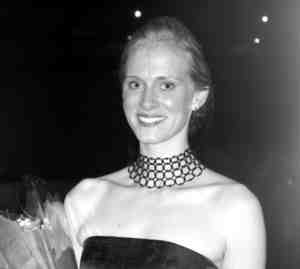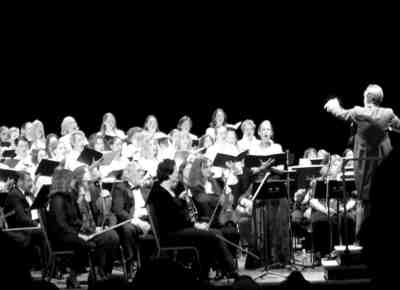Article by Sue Snively
Local Artists – January 2006 – Colorado Central Magazine
THE TRIP TO DENVER was wrought with trials and trepidation due to an advancing snow storm. A semi had jack-knifed on Interstate 70 east of Frisco which meant taking a detour over icy Hoosier pass to take stormbound U. S. 285 on into the heart of the city.
The ultimate destination was the new Ellie Caulkins Opera House, located in the Denver Performing Arts Complex. Our purpose for visiting was to hear the Denver Opera Company with Chorus and Orchestra, conducted by Maestro Nicholas Laurienti, perform Giuseppe Verdi’s Requiem.
Of course, anyone coming from a small town in the Rockies, generally takes in a bit more than the main purpose of the visit; thus our walk down the 16th street mall enjoying all of its sights and sounds. The highlight of our jaunt from the hotel to the performing arts center was a hollow blue bear, standing at least 50-feet tall, that peered into the center — apparently mesmerized by the fine sculptures within.
The Denver papers have printed a lot about the new opera house, both favorable and unfavorable. Suffice it to say that I was too engrossed in the superb performance of Requiem to notice anything more than the sliding back of my chair, which I found to be quite comfortable.
Maestro Nicholas Laurienti has had 40 years of experience as a conductor, teacher and performing artist. He founded the Denver Opera Company in 1975, and it has produced significant works throughout its history. Now, due to involvement by Ellie Caulkins and the Caulkins Foundation, it has a permanent home in the Ellie Caulkins Opera House.
One could spend a lot of time expounding on the performance, but since the purpose of this article is to focus on one of the performers, Tina Lovejoy, who resides in the Arkansas Valley, a brief account will have to suffice.
As the program explains, Giuseppe Verdi’s Messa da Requiem was composed to honor the memory of the Italian poet and novelist Alessandro Manzoni, a man whom Verdi had always admired. Verdi was so profoundly affected by the death of Manzoni that he could not bring himself to attend the funeral. Instead, Verdi later paid a private graveside tribute with the intent of offering up something much more substantial. The result was Verdi’s great Requiem Mass which takes the listener through an entire range of human emotions about the reality of mortality.
From the relatively quiet beginning of the first movement, through to the forceful, but subtle end of the last movement, the beauty and flow of the music really got to me. The integration of the orchestra and chorus, with one never overshadowing the other, was remarkable.

The Requiem featured four soloists, including Tina Lovejoy as Soprano, Bonnie Von Hoff as Mezzo Soprano, Alex Sierra as Tenor, and Christopher Job, as Bass. All were remarkable, in solos and when singing together. There were times when the entire orchestra and chorus were essentially accompanying the soloist, yet the voice of the individual soloist always stood out. This not only speaks to the talent and forcefulness of the soloists, but to the superb conducting of Maestro Nicholas Laurienti. In fact, it was evident from the beginning how well he utilized the talent of the soloists and performers in the orchestra and chorus to create an outstanding performance of a rather challenging production.
IT’S HARD TO SINGLE OUT any soloist in the Denver performance, as they were all outstanding, but Tina Lovejoy, the soprano soloist, certainly gave a command performance. When Tina gave voice to the archangel Michael, in Sed signifer sanctus Michael, it was powerful enough to bring tears to my eyes.
Verdi’s Mass concludes with the Libera me, which is a prayer for the eternal rest of the departed, set in the form of a fugue. Tina, with the chorus singing quietly with her, did a wonderful job of conveying the strong emotion in this remarkable ending.
Tina Lovejoy is one of Central Colorado’s own, so to speak, in that she resides with her husband, Wayne, and two daughters, Paige and Lauren, in Buena Vista and has performed many times in the Arkansas Valley. This summer she served as a soloist for the Alpine Orchestra and in October, she gave a performance at the Salida Steam Plant Theater, with Rod Schleicher acting as the piano accompanist. That concert ranged from arias from Mozart and Handel operas to Jazz renditions from American composer, George Gershwin, all of the above speaking to the versatility of the performer.
So how did Tina Lovejoy become such an outstanding performer?
She began studying piano at age seven and continued with that endeavor until she took a voice lesson for fun when she was fifteen. The voice teacher taught her a classical technique and told her that with it she could sing anything. Tina was totally taken with the challenge and knew that singing was what she really wanted to do. As she says, “It was the text, the words that did it for me.” She quit studying piano and has concentrated on her voice ever since.
TINA GREW UP in Vancouver, Washington, where performance opportunities were limited to church musicals and school choir programs and competitions. But she was lucky enough to have parents willing to drive her to Portland for voice lessons. Tina says her parents encouraged her by letting her lead the way in going as far as what she wanted to achieve. “They never hindered me, but didn t push me either. It seemed like a very healthy balance for a parent to have.”

As a teenager, much of her skill was essentially self-taught. She would spend nights and weekends in her bedroom with a CD and opera score listening to the music and visualizing the performance in her head. She listened to Maria Callas, Kiri te Kanawa, Anna Moffo – all great sopranos. “This was invaluable,” says Tina, “because it informed my ear as to what excellent singing is, a fine blend of vocal technique and artistry.”
As part of her self-training, Tina was constantly singing opera around her four siblings, and her younger brother really got tired of hearing it. “It’s so loud, so obnoxious,” he would tell her – when he wasn’t saying, “Zip it with that diva stuff!”
Finally, Tina informed him that if he would promise to never complain again, she would promise to buy him a Porsche if she ever made it big in the opera business. Tina’s brother did keep quiet after that, but so far no Porsche. Maybe, though, as Tina rises in the Opera world, that Porsche will become a reality. Except, as she remarks, “Hopefully, he has forgotten about that promise!”
After high school, Tina continued formal vocal studies at Boston University and the San Francisco Conservatory of Music. She chose Boston University after participating in The Tanglewood Music Program. The director of that summer program was head of the vocal program at B. U. He handpicked Tina, and helped her obtain scholarship money so she could train in the University’s vocal program.
The San Francisco Conservatory was chosen because of its small student to teacher ratio and great location. Tina’s college training included music theory, sight singing, diction, music history, and stage movement classes as well as repertoire coaching, private vocal lessons, master classes, and performance opportunities. Because Italian is the prevalent language in opera (Italy is the birthplace of opera) any potential opera singer must be fluent in that language, and Tina also studied German and French, two other languages used in opera scores.
Tina Lovejoy has gone through different phases regarding which composers she preferred, with her tastes guided by what she felt her voice was ready to handle. During her time at the San Francisco Conservatory, it was definitely Mozart. “His writing is perfect to help singers find their vocal line – the place where a voice is truest, not pushed, but not held back; he is great vocal medicine.”
Now that her voice has grown, she is embracing composers like Verdi and Puccini. “Their writing demands a completely different feel than Mozart. Even though I don’t change my basic technique, it embodies itself differently. It feels physically different to sing their words.”
WHERE DOES Tina go from here? She would definitely like to be a regular with the Denver Opera Company, which is planning to present three fully staged operas and two major choral works next season. Tina thinks the Music Director, Maestro Nicholas Laurienti is fabulous and she hopes to continue their working relationship.
Exciting things are in the works for the company and Tina Lovejoy would like to be a part of them. She will continue to add new roles to her repertoire and will concentrate on preparing for some major vocal competitions this spring.
From a logistics standpoint, living in Buena Vista is a bit of a disadvantage for her because of the travel time to Denver for auditions, rehearsals and performances. But as she says, “Every time I make the drive, I am thankful that it ends in such an exquisite place with its unparalleled beauty and incredible people.”
With certainty, it can be said that Tina Lovejoy adds to the list of incredible people in Buena Vista and to the cultural richness of the Arkansas Valley.
Sue Snively lives in Buena Vista, two houses away from the Lovejoys. She has become a connoisseur of fine classical music due to the influence of her photographer husband, Frank, who has played the classical stuff for the 40 years she’s known him.


